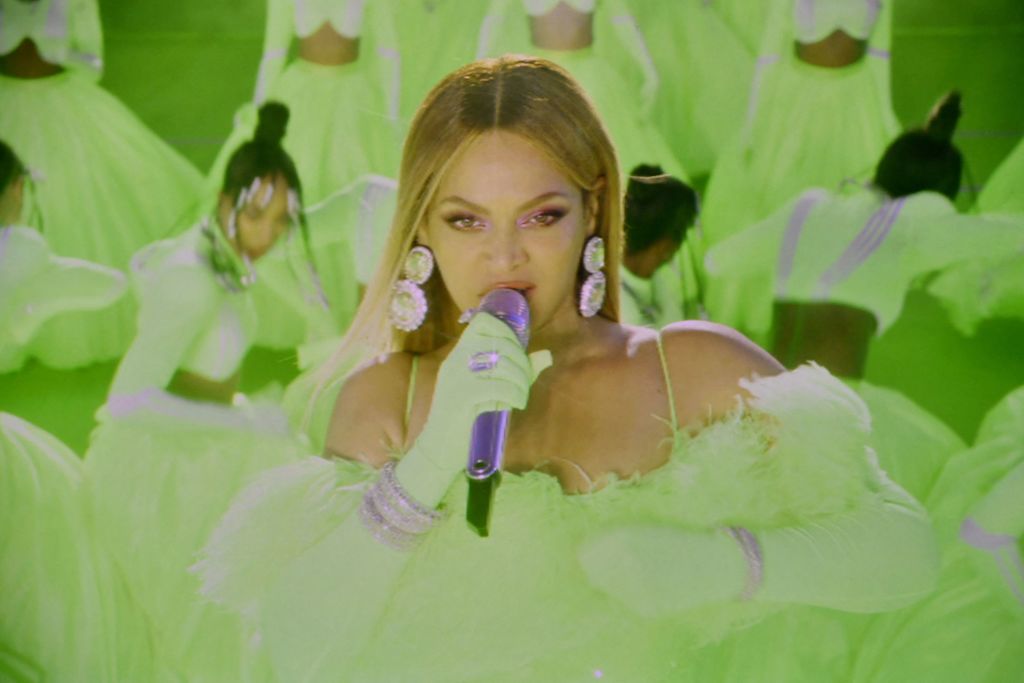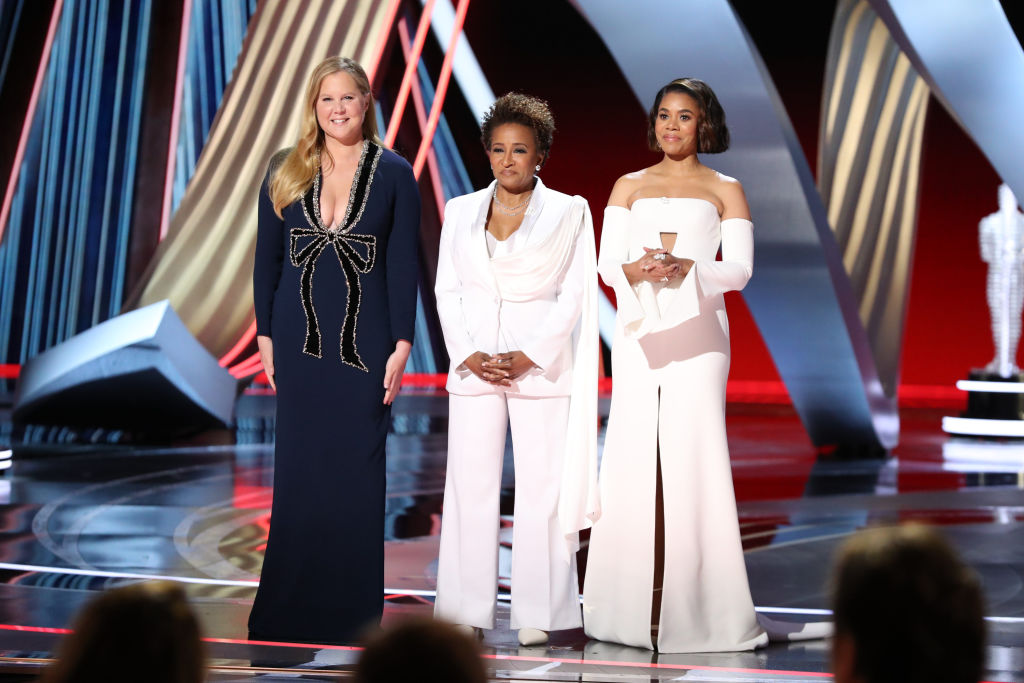It was quite a coup for the Oscars to land a rare performance from Beyoncé, singing her nominated song from King Richard on the same Compton tennis courts where Venus and Serena Williams got their start. But the fact that the luminous production number, featuring dozens of musicians and dancers swathed in neon, tennis-ball chartreuse, opened the telecast meant you had to wonder: Could any act that followed Beyoncé possibly make the same impact?
Well, one did—just not in the way that anyone involved in the show’s production had planned. Long before the ceremony ended, it was clear the 94th Academy Awards would be remembered as the year Will Smith leaped onstage to slap Chris Rock for making a tasteless joke about his wife, Jada Pinkett Smith, then went on to win top acting honors for his role in, yes, King Richard, and accept the award with a speech in which he rambled disconcertingly about love and family. Entertainment media will surely spend the week ahead adjudicating how to divide the blame between Smith, Rock, and various vaguely defined societal forces, e.g. toxic masculinity. But since this is a review of the telecast as a whole, I’d be remiss not to acknowledge the extent to which the shock of Smith’s interruption was compounded by how snoozy and promotional Sunday’s Oscars felt during the two-hour interval between Beyoncé and the slap.
It wasn’t supposed to be so boring. I have trouble recalling the last year when the Oscars weren’t mired in controversy, from #OscarsSoWhite and #OscarsSoMale to the Kevin Hart saga that led to three host-free years and the spectacle of men who’ve been accused of sexual misconduct “supporting” Time’s Up. But the run-up to 2022 was contentious even by that standard. While responses to the first hosts since 2018—Regina Hall, Amy Schumer and Wanda Sykes—were muted, virtually all other news regarding the telecast provoked a backlash. Fan-favorite awards decided by Twitter and appearances by celebrities who had nothing to do with movies, like DJ Khaled and Tony Hawk? It reeked of futile pandering to an 18-34 demographic that’s never coming back to linear TV, much less awards shows. And that’s exactly what it was. The out-of-place presenters were almost uniformly awkward, and the crowdsourced top 5 lists were dominated by superhero fandoms. Meanwhile, producer Will Packer’s decision to pre-record some categories earlier in the evening, in a misguided attempt to keep the show moving, turned out to be a bust. This year’s show ended up being even longer than its predecessor, zooming past the 11:30 (ET) mark amid the Smith-Rock sideshow.

Read More: Will Smith Slaps Chris Rock at the Oscars After Joke About Wife Jada
The hosts should’ve been able to riff on these missteps, as well as the many debates that swirled around the nominees: Was Licorice Pizza appropriately critical of the racism it depicted? Was Don’t Look Up a perceptive climate-change allegory or excruciatingly smug? Was the night’s big winner CODA a moving film about a hearing girl raised by a deaf family, or did it relegate those deaf characters to props in her story? Instead, although I found Hall’s thirsty act winning and Schumer was wise to keep her engagement with the Smith ordeal minimal (“I’ve been getting out of that Spider-Man costume, did I miss anything?”), they skimmed the surface, almost always erring toward noncontroversial humor. Aaron Sorkin is too self-serious, Lady Gaga and Jared Leto did goofy accents for House of Gucci, Leonardo DiCaprio keeps getting older but his girlfriends stay the same age—we’d heard better versions of these jokes before.
Beyoncé aside, the highlights were the heartfelt acceptance speeches by newcomers to Hollywood’s A-list, from best supporting actor Troy Kotsur shouting out the world of deaf theatre to best supporting actress Ariana DeBose expressing how proud she was to represent her communities as an “openly queer woman of color, Latina, who found her strength through art.” In a subtle, probably unintentional rejoinder to the burst of machismo that immediately preceded his best documentary feature win, for Summer of Soul, Questlove broke into tears talking about his late father. None of the winners humiliated themselves by hogging the mic or pushing weird political agendas. (Best director winner Jane Campion, always a bracing off-the-cuff speaker, appeared to be on her best behavior after having to apologize for slighting the Williams sisters at the Critics Choice Awards—another controversy Sunday’s hosts gave a wide berth.)
Unfortunately, these pure moments were overshadowed by a deluge of Disney marketing. When you remember that the megacorp owns not just ABC, the network that aired the ceremony, but also Hulu, Marvel, Pixar, and more, then the entire pre-Smith night starts to look like one big advertisement. Commercial breaks overflowed with plugs for the Disney empire’s films, TV shows, and platforms. It was kind of distasteful, I thought, to follow up Kotsur’s win with a video of Chris Evans congratulating him, then transitioning directly into a promotional clip from his upcoming Toy Story spinoff, Lightyear. When BTS appeared in a video rhapsodizing over Disney and Pixar musicals, was that an ad or part of the entertainment? It was almost as if Disney was trying to distract from the media maelstrom surrounding its bungled response to Florida’s “Don’t Say Gay” bill by bombarding viewers with tantalizing images of its content.

Read More: The Best, Worst, and Wildest Moments From the 2022 Oscars
I don’t think that promotional tone is entirely unrelated to the blandness of the telecast’s scripted portions. For most brands—especially ones as big, broad and family-oriented as Disney—there’s no upside to risking an association with anything provocative or controversial. So the jokes had to be tame. The stage banter had to stay superficial. And if the presenters could be grouped to ABC and its parent company’s advantage, like the trio of Disney princesses past and future, so much the better.
Of course, Will Smith shattered that veneer, in a bizarre altercation made all the more confusing by the broadcaster’s choice to mute the time-delayed audio as the actor jumped onstage, slapped Chris Rock and shouted at him to keep Smith’s wife’s name out of his mouth. (An uncensored version from Australian TV quickly made the rounds on Twitter.) And although the ceremony he interrupted was far from an Oscars for the ages, the spectacle that began with his outburst and continued, not long after, with his best actor acceptance speech was no improvement.
Regardless of whether his anger was warranted, Smith upstaged every award and segment that came after Rock’s presentation. Questlove’s victory, The Godfather’s 50th anniversary, an In Memoriam segment that paid tribute to lost legends like Sidney Poitier and Betty White—they all got steamrolled by a conflict between two guys who really should’ve waited to settle their differences backstage. Who could concentrate on Jamie Lee Curtis snuggling an adorable puppy when one extremely famous man had just hit another extremely famous man on live TV?
Smith looked to be genuinely in pain, at the podium, as he connected his alarming attempt to defend Pinkett Smith with his character Richard Williams’ divisive persona. “Art imitates life. I look like the crazy father,” he said. “Love’ll make you do crazy things.” There’s almost certainly more to this story than those of us outside Smith’s and Rock’s circles of trust will ever know. And to his credit, he did apologize to the Academy and his fellow nominees in his speech. But by then the damage was done. Lots of trophies got handed out on Sunday, as millions of dollars’ worth of promotional content filled our screens. But with even the biggest and most heartening awards reduced to footnotes, that final hour didn’t give us much worth celebrating.
For more of TIME’s culture coverage, subscribe to our entertainment newsletter, More to the Story, by clicking here.
More Must-Reads from TIME
- Cybersecurity Experts Are Sounding the Alarm on DOGE
- Meet the 2025 Women of the Year
- The Harsh Truth About Disability Inclusion
- Why Do More Young Adults Have Cancer?
- Colman Domingo Leads With Radical Love
- How to Get Better at Doing Things Alone
- Michelle Zauner Stares Down the Darkness
Contact us at letters@time.com